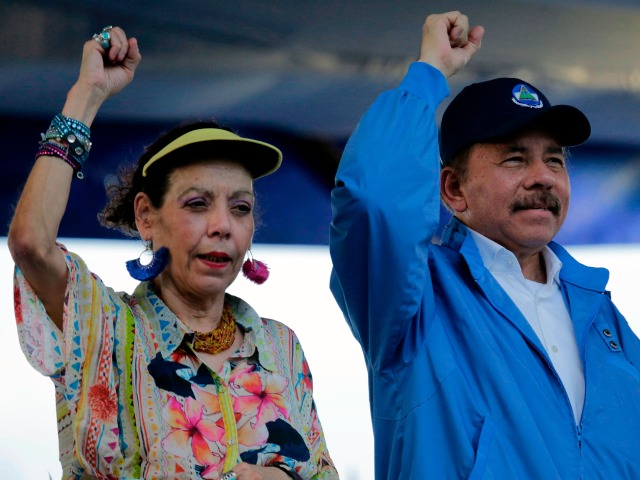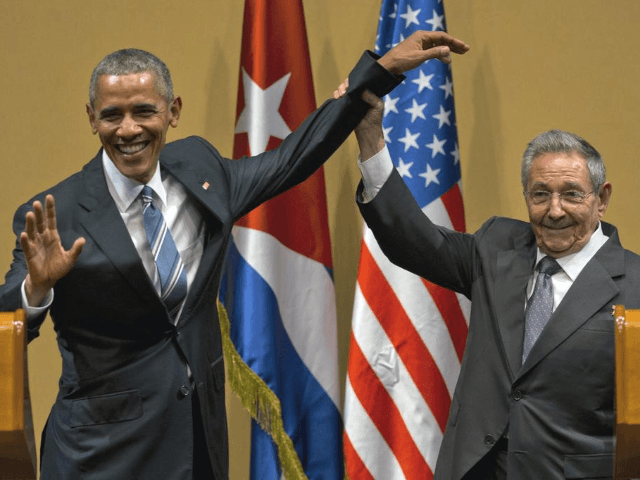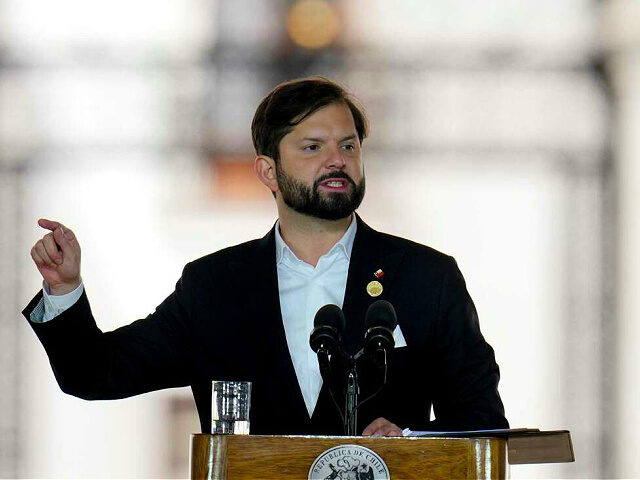Far-left President Gabriel Boric of Chile used his platform at the United Nations General Assembly on Wednesday afternoon to denounce the communist regime of Nicaragua’s human rights abuses — while at the same time making calls to lift sanctions on Cuba and Venezuela.
The president began his address by exclaiming that democracy is “memory and future,” remembering the events of the ouster of socialist President Salvador Allende in 1973. Boric accused long-deceased American President Richard Nixon of promoting the failure of Allende’s government, citing alleged American “evidence.”
Wednesday marked Boric’s second address to the U.N. General Assembly since taking office in 2022. Last year, shortly after his first speech, Boric, condemned leftists who fail to criticize human rights abuses committed by leftist leaders during an event held in New York.
“So it really pisses me off when you are from the left, so you condemn the violation of human rights in, I don’t know, Yemen or El Salvador, but you cannot talk about Venezuela or Nicaragua,” Boric said in 2022. “Or Chile! In Chile, we had several human rights violations in the social unrest [of 2019]. You don’t have to have a double standard.”
This time around, while he condemned the Sandinista regime of Daniel Ortega in Nicaragua, he failed to offer a similar condemnation of the Cuban and Venezuelan regimes, who maintain two of the most extensive records of human rights atrocities of any nation at the General Assembly.
“I feel I have the duty to denounce before this Assembly and the world the persecution that today all those who think differently from the government of the dictatorial regime of Mr. [Daniel] Ortega and [Ortega’s wife and vice president Rosario] Murillo, in Nicaragua, live under,” he said.
“Not only are they [opponents to Ortega] prohibited from participating in elections, but they are also persecuted, deprived of their nationality, their homes are raided, and they are deprived of their political rights,” he continued.
Boric has condemned the Ortega regime several times in his presidency which has drawn the ire of both Ortega and Venezuela’s socialist dictator Nicolás Maduro. Ortega, who previously described Boric as a “lap dog” of the United States, branded him “lil Pinochet” last week.

Nicaraguan President Daniel Ortega and his wife, Vice-President Rosario Murillo, during the commemoration of the 51st anniversary of the Pancasan guerrilla campaign in Managua. (INTI OCON/AFP via Getty Images)
The Chilean far-left president followed his condemnation of the Ortega regime with “imperative” calls for the United States to lift sanctions on the Maduro regime, essentially demanding Washington fund its continued existence.
“We have to say clearly that when sanctions are imposed unilaterally, they are not contributing to the solution,” he said.
“The case of sanctions against Venezuela, today, from our perspective, do not contribute to improving the living conditions of the Venezuelan people,” Boric argued, adding that his government believes it is necessary to organize “free elections, with guarantees for all sectors,” in Venezuela.
In May, Boric condemned the Maduro regime, rebutting Brazilian radical leftist President Luiz Inácio Lula da Silva’s claims that Venezuela’s situation was a “constructed narrative,” rightfully asserting that it was “real, in flesh and bone.” He failed to do the same on the larger stage of the General Assembly.
Similarly, on Wednesday, Boric made calls for the United States to lift its “embargo” on Cuba and remove Cuba from its list of state sponsors of terrorism, echoing demands espoused at the Assembly by other leftist presidents in the region, such as Brazil’s Lula and Colombia’s far-left President Gustavo Petro.
“And in this I want to be very clear: declaring that Cuba is a country that promotes terrorism is not only false, but also violent to us,” Boric said. “And therefore, we urge the United States to follow the line taken at the time by the government of Barack Obama, when it removed them from that infamous list.”

In this March 21, 2016, file photo, Cuban President Raul Castro, right, lifts up the arm of U.S. President Barack Obama, at the conclusion of their joint news conference at the Palace of the Revolution, in Havana, Cuba. (AP Photo/Ramon Espinosa, File)
Boric urged other leaders to “take care of democracy,” expressing his concerns that “progress and rights are threatened by sectarianism and fanaticism of different kinds.” Boric also issued warnings over the purported fragility of democracy against risks that “may not be expressed in the coups d’état of the twentieth century, but in new forms, even some with the appearance of a majority.” He gave no examples of such a situation.
According to Boric, taking care of democracy means “taking charge of the frustrations, yearnings and needs of the citizens, channeling the challenges imposed by our times and moving forward with concrete actions, with prosperity, social justice, sustainability and always putting the collective interest above individual interests.”
“Democracy has to be able to deliver results and we must work hard to do so,” Boric said. “When institutions are slow to respond or fail to do so in time, in a clear way, corruption, organized crime, multiple inequalities, all those challenges that are corroding our institutions, the population ceases to trust.”
On the subject of climate change, Boric made calls for countries with “greater industrial activity” to assume responsibility to be “not only more respectful of the environment, but more supportive.”
The Chilean president concluded his speech by adhering to the calls made on Tuesday by U.N. Secretary-General Antonio Guterres to reform the world governance, political, and financial systems, as well as the U.N. Security Council.
“It’s reform or barbarism,” Boric concluded, clarifying that he preferred reform.
Christian K. Caruzo is a Venezuelan writer and documents life under socialism. You can follow him on Twitter here.

COMMENTS
Please let us know if you're having issues with commenting.